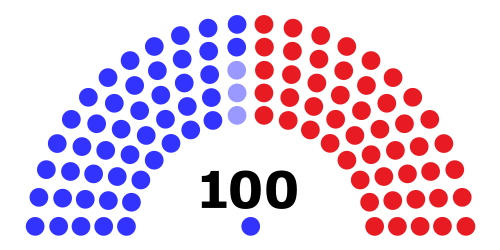
Luis Rubio
The similarity between debates on the future is surprising in the United States and Mexico. Very distinct societies, they are confronting situations that are not entirely different, but their circumstances are indeed radically so, which permits contrasts and learnings that have no equal.

In the U.S., January 6, 2021, changed the political panorama drastically: a key date every four years; it is the day the U.S. Congress certifies the presidential election. For the first time in history, a group of demonstrators, egged on by Trump, invaded Congress, attempting to overturn the legislative proceedings. For the Democrats, this comprised an insurrection, while for the Republicans, it was nothing more than a disturbance. In the end, that same night, Biden was certified, but most Republicans consider the election to have been stolen.

The dispute centers on two elements. First, the election itself; and two, the fact of placing in doubt time-worn constitutional procedures. Concerning the election, U.S. Federalism extends from the bottom up: it was the states that created the Federation, which is why they made arrangements for the conferral of equal representation of the states through the Senate, independently of their population. This arrangement made possible the Constitutional “Great Compromise,” which entails important implications that today are an essential part of the dispute: first, because states with fewer than one million inhabitants, such as Wyoming, are entitled to the same representation as New York or California, each with tens of millions of inhabitants. This is what has created, on at least three occasions in recent decades, that a candidate who won the presidency did not win the popular vote. Also, given that each of the fifty states has its own electoral legislation and its respective authorities, its criteria for organizing and managing elections differs from the rest.

The electoral matter is central to the ongoing dispute and stands in direct contrast with the reality in Mexico; above all, it illustrates how absurd -or Machiavellian- the position of the Mexican President is. One of the most heated points of debate in the U.S. focuses on the dispute on electoral matters concerning the requirements that a voter should fulfill to be able to cast a vote. The Republicans want strict requirements, for which the Democrats accuse them of wanting to restrict the vote. On their part, the Democrats wish to facilitate voting without restrictions. It sounds logical until one observes the content of their proposals: there is not the slightest doubt that the Republicans have their eye on specific states and particular voters (above all, they charge that undocumented residents participate in voting, altering the result), but their proposals, though doubtlessly restrictive, are minor affairs compared with the Mexican electoral system. For example, the Republicans demand that voters present official identification. The Democrats want to expand alternative means of voting, such as voting by mail and Internet, and they are opposed to any requisite involving the presentation of an I.D.

The most visible (and effective) factor of Mexico’s electoral system -the voter I.D.- is rejected by the Democrats as a matter of principle. Both parties want to win the governorships that will hold elections toward the end of this year because that will allow them the opportunity to modify districting in their favor (another dramatic contrast with Mexico, where the institution responsible for districting is independent and autonomous). The differences in the modes of managing the electoral processes lend themselves to the type of controversies behind these examples. Still, their political implications are enormous and at the heart of the second point of controversy.

The language says a lot: for some is a disturbance; for others is an insurrection. The Republicans say that the Democrats want to close the door to a possible second Trump presidency (which is obvious) while wanting to ensure control of all the legal, administrative, and electoral mechanisms for this to happen. The answer to all this lies in the midterm elections slated to take place in November of this year, which will determine the composition of the two legislative chambers, the thirty-six governorships at stake, and that of the local legislatures. Typically, the president’s party loses the midterms, but that party could lose both chambers this year, and, if it doesn’t lose them, the Republicans will claim election fraud with all their might. What’s up for grabs for 2024 is, well, incommensurable.

These circumstances have given rise to the publication of books* and articles asserting that the country is at the point of succumbing to a Trumpian dictatorship, not an inconceivable scenario but a realistic one?

Indubitably, both parties have exacerbated the polarization, each blaming the other. It is also not impossible that another Trump government would degrade American democracy even more so due to the sole fact of its not respecting the institutions. Although one must recall that, while he did defame them, he had no choice but to adhere to the rules, a huge difference from Mexico.

Mexicans face precisely the reverse: they have a great electoral institution now under attack but an excessively powerful president who does whatever he wants without encountering any limit, except, until today, what the National Electoral Institute (INE) represents and, at times, the Supreme Court. The risks are very different if citizens keep on allowing this.

*The most prominent being Barbara Walters, How Civil Wars Start
@lrubiof
